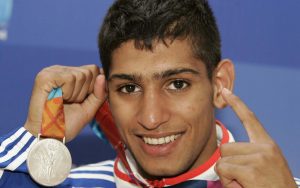Amir Khan fires off the final six rapid punches of a workout in his Californian gym, grins broadly and grabs a towel to soak up the sweat pouring from his brow.
The Briton does not look like a man ready to give up the sport that has been his life, and yet that is the reality. He fights WBO champion Terence Crawford at Madison Square Garden on Saturday, and many are suggesting that this could be the last stand in a 16-year career that has brought Khan global exposure and close to £30million in earnings.
Khan does not contradict them. In an exclusive interview with Telegraph Sport, the 32-year-old admits that he “is close to the end, the final chapter” and says that, were it not for his two daughters, he would have retired already.
Khan is in the mood to share. Over the course of the two hours we spend together in Hayward – a small city near San Francisco – he also reveals that he has suffered racism and racial profiling, not to mention hatred, through his entire career; that he would fight MMA star Conor McGregor in a boxing match; and how the challenge against one of the pound-for-pound kings Crawford has got the best out of him over the course of 12 gruelling weeks of camp.
Apart from the night three years ago when he stepped up to middleweight to fight Saul ‘Canelo’ Alvarez – who was nearly 25lbs heavier than him – this assignment against Crawford is the toughest technical battle of his career. “It’s a massive fight for me. I have to be disciplined from start to finish,” he explained. “This is a very big occasion for me, maybe my last chance to have a big fight in America. I want to make sure I win this fight, as I don’t want this to be the last.
“Time flies. Canelo was a big fight for me, one I perhaps should not have taken. Now it’s New York – the mecca of boxing – at the old arena of Madison Square Garden. All the great fights happened there – Muhammad Ali, Mike Tyson, Prince Naz. This is another one for me to check off my list.”

Khan has the perspective which comes naturally to someone who has been immersed in boxing for the best part of two decades, and the focus of media attention since his startling performance at the 2004 Athens Olympics, when he won a silver medal but was feted as a champion on his return home, but also as a man whose horizons also stretch beyond the ropes.
Having reconciled with his wife Faryal Makhdoom in February 2018, his second daughter, Alayna, is now approaching her first birthday – his eldest, Lamaisah, was born in 2014 – and they have given what is left of his career a new focus.
“They’re my motivation,” he insists. “I would be retired already if I didn’t have them. I wouldn’t have anything else to gain but I want to put a smile on their faces. Lamaisah goes to school now and tells everyone her daddy’s a boxer, that daddy will be fighting in Madison Square Garden in New York. I want to make them proud. I always want to show you have to work hard in life. If you work hard at something in life, you can achieve it.”
Not that his path to this point has been entirely smooth. The defeat to Danny Garcia in December 2012 remains arguably his most chastening moment inside the ring, a loss which left his plan to move up to the welterweight division and an eventual meeting with Floyd Mayweather Jr in tatters.
But it is the struggles outside the ring which are perhaps most striking. Khan spoke in stark terms in 2017 of being subjected to racial profiling during his trips to the US, and is still subjected to that treatment now – even if he has learned to find a grim humour to it.
“I’m always getting pulled over because of my name, because I travel to Pakistan, for religious reasons. Every time I come into America I’m checked. I never really argue about it or fight about it. It is what it is.
“It’s funny, it comes up on the system to do extra checks. And then every time I’m at the counter they recognise who I am. They put me to the front of the list, call me up and it’s always fine.”
Khan insists he has not experienced such incidents in Britain, although there is the ever-present threat of internet trolls to contend with.
“You get hate the day you become famous. The day you don’t get hate, you’re finished. I’ve been getting hate from the day I made it into the newspapers for the first time at the Olympics. I never let it get to me. I just go with the flow.”
But will he really be able to give it all up? Boxers are not renowned for finding their post-fighting life straightforward, but even though the prospect of a tangle with McGregor appeals to his sense of the spectacular – “it would be amazing, but I don’t want to fight him in the cage because he’d destroy me” – he seems adamant.
“Boxing is dangerous. You can get injuries. It’s not about the money. It’s about your health and if you’re happy with what you have achieved. It is the last chapter, I mean that. One more victory might just be enough.”
